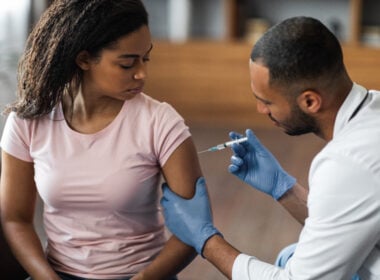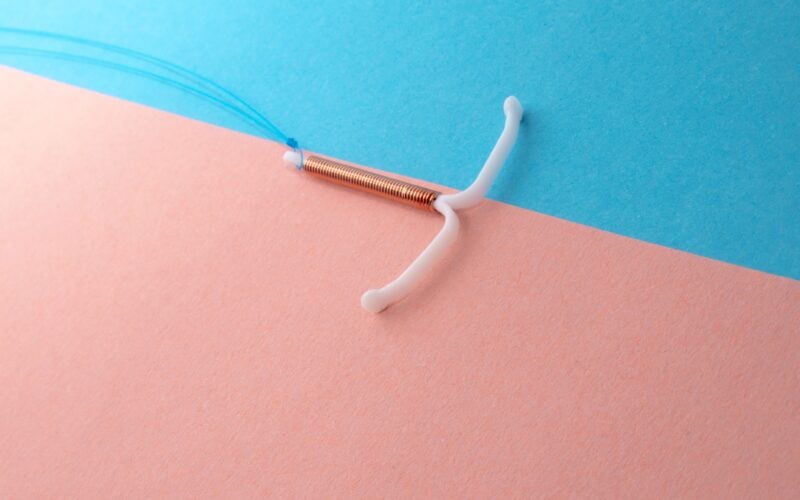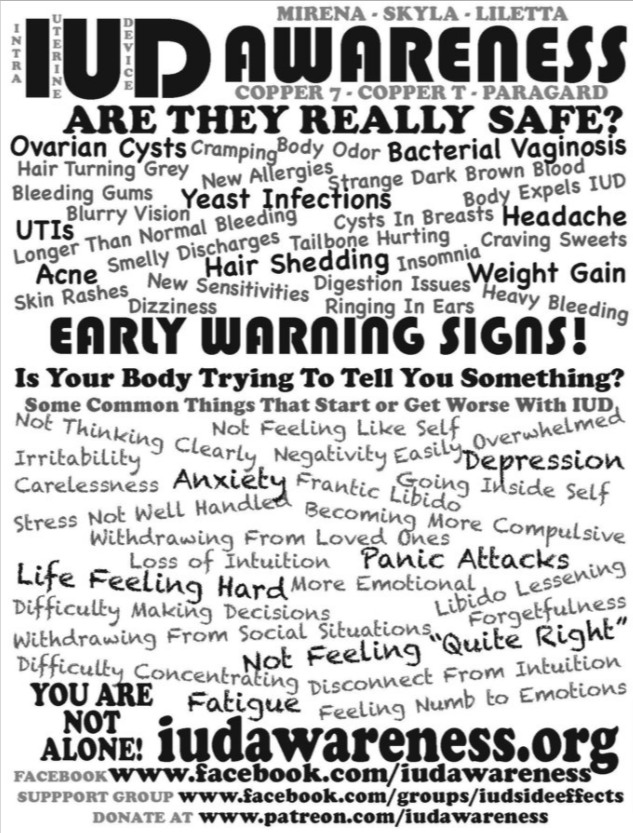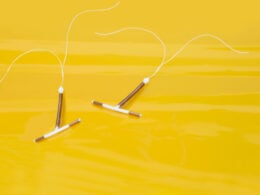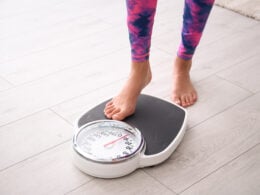After the copper IUD caused Tamara Wilder physical symptoms like sore tailbone and heavy bleeding, followed by more severe symptoms of debilitating anxiety, she founded IUD Awareness, a website with resources for women who have experienced adverse reactions to the IUD. Tamara now also serves on an online IUD support group and says it was finding other women’s stories that helped her find the cause of her health problems. Here is Tamara’s story.
I didn’t recognize the early warning signs when they started happening. Like so many of us, things were going on in my life, and so when I started feeling weird, which when I look back, was right away. Within days of having it inserted I was having a really sore tailbone. I couldn’t sit down for about three or four months without having pain. And I didn’t even identify that as an early warning sign until way later when I got on support groups and I started seeing other people mention it; but it was way at the very beginning.
And then I had a lot of heavy bleeding. I was warned that I would bleed more than usual for several months, and I was bleeding pretty heavily, so I told myself, “I just have to get through this.” And like many doctors, my naturopath said, “your body’s going to do weird things for a few months but you just gotta bear through it, but then it’s all going to calm down and this thing’s going to be great for you.”
But it wasn’t great for me.
This was the first time I’d put anything in my body or altered my body for birth control. And since I’ve joined the support groups and hear other women’s stories, and hear how many birth control types they’ve gone through and how many problems they’ve gone through, I feel incredibly lucky.
The copper IUD did not work for me. It was something that my body responded to negatively from the very, very beginning. And I still was trying to give it a try because my naturopath said it was great. I’d actually had it inserted at Planned Parenthood and they were so pro-IUD. And I remember in the first couple months I would call and say, “I’m bleeding a lot; I’ve sort of bled all month, and it hasn’t stopped.” (I bled about three weeks of every month that I had the IUD, and I would spot every week that I wasn’t heavy bleeding, so I really was constantly bleeding.)
And I was in a new relationship, which was very problematic; this was a bloody, bloody existence. That’s one of the things they tell you [with contraceptive devices]: you can have trouble-free sex, without worrying about getting pregnant. But if you’re bleeding all the time on the copper IUD, that doesn’t make sex very fun.
Ultimately, I had a very negative experience with the IUD, but it took me ten months to figure out what was going on. Even though my body reacted so negatively from the very beginning, looking back I can see the early warning signs. And for that reason, when I did finally make the connection and figured it out, I felt really driven.
From fog to clarity
I was very fortunate that I had a lot of support in my recovery. I was very fortunate that financially, my family helped me out and allowed me to not have to worry about finances for a year; they told me to just take care of my health. And so part of my healing process was getting the word out and telling people my story. Because when I was first trying to figure it out, five months in, I searched like crazy but could not find the information I needed; in fact, I found information that diverted me from what was going on.
So I just wanted to make that information available to people and make a place where stories could be told and people could find them. And so I founded IUD Awareness as a part of my healing process. On the support groups I was seeing so many people having to recover while they had children, while they were still working, while they were struggling on a daily basis—and all of us struggle on a daily basis to recover. So many of us have hard recoveries, but I was being so supported in my recovery and in my financial existence for my first year. So I felt what I needed to do was to put my time and energy into creating an entity that could help people.
The freedom found in IUD support groups
When I found the IUD Side Effects support group it was almost six years ago, and there were 1800 members. At the time there were three admins, and I became the fourth admin. Because it was growing so fast, that it was really overwhelming…
We get about 100 member requests a week, which is our average. When a film comes out, or like when The Bleeding Edge came out all of a sudden, that went to 200 or 300 a week. And we lose a certain amount, so we’re gaining a net of about 50 members a week as a really constant growth rate, and we’re almost at 25,000 now, which is incredible.
Not everybody on the group has IUD side effects; many women are on the group because they’re looking for side effects. They feel like the IUD is working for them, but they’re trying to empower and educate themselves. And I am very supportive of that because if I had had that information, I would have been able to see the side effects that were plaguing me. Some women don’t see a problem, and they feel like it’s fine. But the majority of the women on the group have seen side effects, have had their lives devastated, have already removed the IUD, and/or are in recovery. We also have some women on the group who are considering getting the IUD, and they’re doing their own research and finding women’s real-life experiences instead of what I call propaganda, hearing all the good things instead of being told what can go wrong.
And we’re not saying on the support groups and on IUD Awareness that an IUD will always go wrong, but we’re saying that it’s going wrong more often than people realize. Because the stories aren’t being reported.

Personally, after my experience and after reading all the stories, I do not think that IUDs are safe; I would never recommend them to anybody, but everybody needs to be able to make their own decisions. So by sharing our stories and real-life experiences, people can choose to take the risk, and realize that getting an IUD is actually a risky choice, despite being told it’s totally safe by the doctors who are promoting it to you. And if you do your research you realize it is not totally safe, that there are chances that it will go wrong—and when it goes wrong, it usually goes really wrong. Some people have minor problems, but the majority of people on the support group have huge problems… We’re trying to find people before they’re in that severe state so they don’t have to go through the depth of the health crisis that so many of us have.
Common threads in IUD side effects
One of the trends I see on the support group is people say “the doctor told me to keep it.”… They say, “it’s a foreign object in your body, your body’s going to react to it, but it will get used to it.” And my response to that is: our bodies will adapt to most anything, but that does not mean that the state that we end up in is a healthy, balanced state.
In the training that doctors are receiving, they’re being told don’t take it out too soon; if someone’s having problems with it, get them to hang in there; get them to have it for at least six to eight months before you will take it out. And so that’s why, so many of us, if our bodies are telling us from the very beginning that it’s not working for us, we go to the doctor, and the doctor, if they’re experienced with IUDs, they’ll say “you just have to hang in there.” And if they’re not experienced with IUDs, like my general practitioner, they’ll say, “there’s no way what is happening to you could be related to the IUD, it must be something else.”
My IUD and severe anxiety
In my case, I had worsening symptoms for five months that were taking me down in so many ways. My mental state was degrading really quickly and I didn’t realize what was going on because I never suffered from anxiety before. I’ve always been a very balanced person; I never had any depression or any anxiety. And so I just thought I was feeling tired; I just thought I was feeling stressed. But I was actually falling and running over the cliff and one day I just went over the cliff into the big pit of massive anxiety. And I had a breakdown.
I got diagnosed with sudden anxiety disorder and put on Ativan and then Paxil. My doctor kept increasing the doses of Paxil, and I was completely dysfunctional. Within five months of getting an IUD I went from running my own business, being a super independent person (I’m admired for my independence and my ability to handle anything, because I teach ancient living skills! I teach people how to survive in the woods!) and within five months, I collapsed completely into an agoraphobic, hiding person in a room in my parents’ house, and taking these anti-anxiety meds that were not doing anything. Totally suicidal. Totally not understanding, feeling disconnected, feeling like I was living on a different planet, like a foreign world. And it was a devastating thing. And that started five months after my IUD was inserted.
And for the next five months, I would try to figure it out; I would go online and search and I would try to find answers, and I wouldn’t find anything. Everything would say the copper IUD couldn’t cause these kinds of things. Everything was saying, “oh, it’s totally healthy” which is the propaganda I was finding in my searches. And my mind wasn’t together enough to go deep enough to find all the stories; everything I was finding at the time was pro-IUD. And so I kept saying “well the doctors are saying it can’t be related; I’m not finding anything on the Internet.” I’d find a few little things and then the doctor would say “well that’s just a hack.” And then he told my parents, “don’t let her use the Internet anymore because it’s increasing her anxiety.” And so I actually stopped searching.
About six or seven months in, I had just given up. My doctor just kept saying, “you just have to accept that this happens to women sometimes and you just need to adjust. There’s something you need to change in your life and you just need to adjust to this.”
Funnily enough he was right; the thing I needed to change in my life was I needed to get a foreign object that was poisoning me out of my body, and that made everything get better. But that wasn’t what he was talking about; he was talking about something in my brain.
And that is one of the trends that we on the support groups. And I don’t really see any changing trends; what I see on the support groups is everybody has different clusters of symptomatology. And so we have common clusters, and everybody’s clusters are slightly different, but we have common things that everybody sees. And to me, anxiety disorders and depression—either starting anew, or if you already have it, it getting worse and the things that used to work for you not working anymore—is the predominant thing. Almost everybody experiences some level of that, altering their body.
And I think it is something from what’s in the IUDs; a little bit probably toxicity issues of things that could be causing the anxiety, but I feel that for me, because it went away so quickly after removal—my debilitating anxiety was gone within twenty minutes of the IUD being removed from my body.
So for me it was a foreign object inside my body; I call it a body invasion issue. Our bodies respond to foreign objects being put into them, and the anxiety is the way that they respond in trying to tell you that something’s wrong. But what happened with me was I was being told that something was wrong, but I wasn’t looking in my body for the source, I was looking outside in my world for the source but I couldn’t find it. And the side effects almost keep us from seeing it.
Watch Natural Womanhood’s full interview with Tamara below.
To learn about safe and effective nonhormonal methods of family planning, click here to learn about Fertility Awareness Methods.
Additional Reading:
Why the Copper IUD Is Not the Natural Birth Control You’ve Been Looking For
How the IUD, Implant, Pill, and Other Birth Control Methods Work
Yes, Birth Control Affects Mental Health. Here’s Why It Isn’t Addressed


